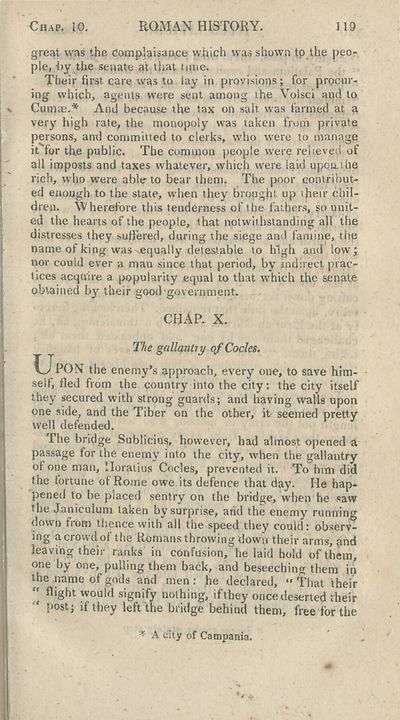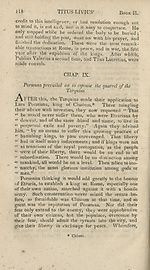Download files
Complete book:
Individual page:
Thumbnail gallery: Grid view | List view

Chap, IQ.
ROMAN HISTORY.
great was the domplaisapce which wgs shown tp the peo¬
ple, Qy the senate at that time.
Their first care was to lay in provisions; for procur¬
ing which, agents were sent among the Volsci atid to
Cumae.* And because the tax on salt was farmed at a
very high rate, the monopoly was taken from private
persons, and committed to clerks, who were to manage
it'for the public. The common people were relieved of
all imposts and taxes whatever, which were laid open.the
rich, who were able to bear them. The poor contribut¬
ed enough to the state, when they brought up their chil¬
dren. Wherefore this tenderness of the fathers, so unit¬
ed the hearts of the people, that notwithstanding all the
distresses they suffered, during the siege and famine, the
name of king was equally detestable to high and low;
nor could ever a man since that period, by indirect prac¬
tices acquire a popularity equal to that which the senate
obtained by their good government.
CHAP. X.
The gallantry of Codes.
I_JpON the enemy’s approach, every one, to save him¬
self, fled from the country into the city: the city itself
they secured with strong guards; and having walls upon
one side, and the Tiber on the other, it- seemed pretty
well defended.
The bridge Sublicius, however, had almost opened a
passage for the enemy into the city, when the gallantry
of one man, Iloratius Codes, prevented it. To him did
the fortune of Rome owe its defence that day. He hap¬
pened to be placed sentry on the bridge, when he saw
the Janiculum taken by surprise, and the enemy running
down from thence with all the speed they could: observ¬
ing a crowd of the Romans throwing down their arms, and
leaving their ranks in confusion, belaid hold of them,
one by one, pulling them back, and beseeching them in
the name of gods and men: he declared, “ That their
“ flight would signify nothing, if they once deserted their
" Post> if they left the bridge behind them, free for the
* A city of Campania.
ROMAN HISTORY.
great was the domplaisapce which wgs shown tp the peo¬
ple, Qy the senate at that time.
Their first care was to lay in provisions; for procur¬
ing which, agents were sent among the Volsci atid to
Cumae.* And because the tax on salt was farmed at a
very high rate, the monopoly was taken from private
persons, and committed to clerks, who were to manage
it'for the public. The common people were relieved of
all imposts and taxes whatever, which were laid open.the
rich, who were able to bear them. The poor contribut¬
ed enough to the state, when they brought up their chil¬
dren. Wherefore this tenderness of the fathers, so unit¬
ed the hearts of the people, that notwithstanding all the
distresses they suffered, during the siege and famine, the
name of king was equally detestable to high and low;
nor could ever a man since that period, by indirect prac¬
tices acquire a popularity equal to that which the senate
obtained by their good government.
CHAP. X.
The gallantry of Codes.
I_JpON the enemy’s approach, every one, to save him¬
self, fled from the country into the city: the city itself
they secured with strong guards; and having walls upon
one side, and the Tiber on the other, it- seemed pretty
well defended.
The bridge Sublicius, however, had almost opened a
passage for the enemy into the city, when the gallantry
of one man, Iloratius Codes, prevented it. To him did
the fortune of Rome owe its defence that day. He hap¬
pened to be placed sentry on the bridge, when he saw
the Janiculum taken by surprise, and the enemy running
down from thence with all the speed they could: observ¬
ing a crowd of the Romans throwing down their arms, and
leaving their ranks in confusion, belaid hold of them,
one by one, pulling them back, and beseeching them in
the name of gods and men: he declared, “ That their
“ flight would signify nothing, if they once deserted their
" Post> if they left the bridge behind them, free for the
* A city of Campania.
Set display mode to:
![]() Universal Viewer |
Universal Viewer | ![]() Mirador |
Large image | Transcription
Mirador |
Large image | Transcription
| Antiquarian books of Scotland > Curiosities & wonders > Titus Livius' Roman history > (123) |
|---|
| Permanent URL | https://digital.nls.uk/115984625 |
|---|
| Description | Thousands of printed books from the Antiquarian Books of Scotland collection which dates from 1641 to the 1980s. The collection consists of 14,800 books which were published in Scotland or have a Scottish connection, e.g. through the author, printer or owner. Subjects covered include sport, education, diseases, adventure, occupations, Jacobites, politics and religion. Among the 29 languages represented are English, Gaelic, Italian, French, Russian and Swedish. |
|---|

